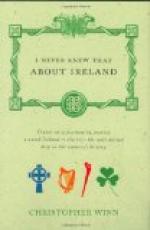It is worth while to state quite quietly and quite plainly how things stand at this present moment. There is no need for hysterics on the one side or the other; and to amend one’s views by the testimony of facts is not a dishonest turning of one’s coat—if confession of that amendment is a little like the white sheet and lighted taper of a penitent. Things are, or they are not. If they are, as will be set down, the inference is plain to anyone not hopelessly blinded by preconceived prejudice. If they are not, let them be authoritatively contradicted on the basis of fact, not sentiment—demonstration, not assertion. In any case it is a gain to obtain material for a truer judgment than heretofore, and thus to be rid of certain mental films by which colours are blurred and perspective is distorted.
No one wishes to palliate the crimes of which England has been guilty in Ireland. Her hand has been heavy, her whip one of braided scorpions, her rule emphatically of blood and iron. But all this is of the past, and the pendulum, not only of public feeling but of legal enactment, threatens to swing too far on the other side. What has been done cannot be undone, but it will not be repeated. We shall never send over another Cromwell nor yet another Castlereagh; and there is as little good to be got from chafing over past wrongs as there is in lamenting past glories. Malachi and his collar of gold—the ancient kings who led forth the Red Branch Knights—State persecution of the Catholics—rack-rents and unjust evictions, are all alike swept away into the limbo of things dead and done with. What Ireland has to deal with now are the enactments and facts of the day, and to shake off the incubus of retrospection, as a strong man awaking would get rid of a nightmare.




